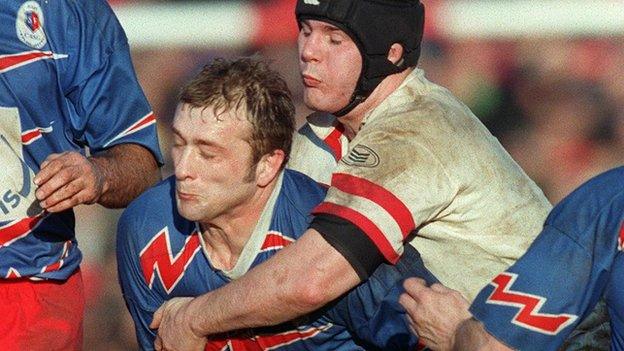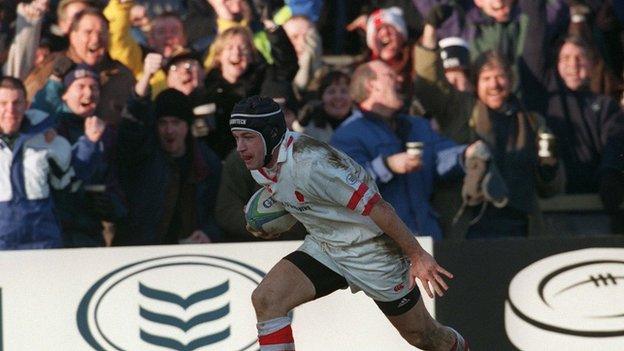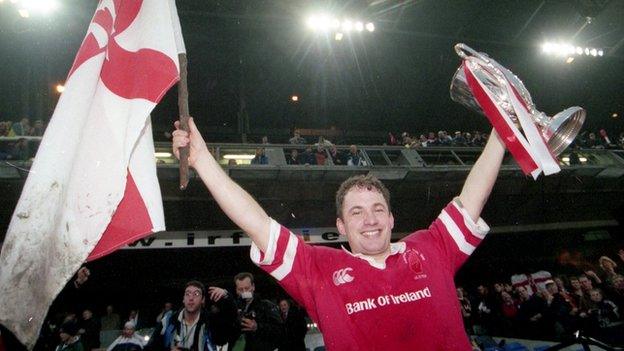'It was Roy of the Rovers stuff' - McWhirter and Humphreys on '99 European triumph
- Published
'It was pandemonium' - McWhirter reflects on Ulster's European triumph
The thought of it still amuses Tony McWhirter... a player carrying out stadium repair works three days before a Heineken Cup semi-final.
In the countdown to the glamour clash with tournament favourites Stade Francais in 1999, Rab Irwin - Ulster's 36-year-old tighthead prop and builder by trade - was busy at Ravenhill fixing the front gates, but he may as well have been there to switch out the lights on the amateur era.
In the month between the quarter-final win over Toulouse and the Stade game, Ulster had to convert a 11,000 capacity ground into a venue capable of housing 20,000.
It posed huge logistical challenges, but it was nothing compared to the transformation taking place on the pitch as a team of amateurs, semi-professionals and a smattering of full-time pros took its first meaningful step into a new professional age, blinking in the bright lights of European rugby.
Irish breakthrough
And what a step it turned out to be, as 16 months on from a 53-point thrashing by Wasps, Ulster became the first Irish side to win the European Cup.
"It was Roy of the Rovers stuff," says McWhirter.
"We were very raw, very inexperienced, and a long way off the pace as well against what was a really good Wasps side full of British Lions.
"It was a bit of thrown-together side, if the truth be told, so that game was a wake-up call for a lot of us.
"The professional game was in its infancy really. We were running on the terraces at Ravenhill and up the hill at Stormont, or using the Mary Peters track or the PEC at Queen's to train, because Ravenhill at that stage was nowhere near ready for professional rugby in terms of day-to-day training.

Stade's Richard Dourthe feels the force of a Tony McWhirter during the famous semi-final win at Ravenhill
"So certainly '98/99 was the first proper year of full-time training in terms of a couple of sessions a day, looking at the way you looked after yourself and thinking more like a professional."
Beating Stade that Saturday afternoon was the perfect storm, with the old stadium rocking to the beat of every Simon Mason kick and David Humphreys' memorable try. Three weeks later they would be crowned champions.
Yet the fairytale season had started out more like a nightmare, Ulster 14-0 down in the opening game at home to Edinburgh Reivers before scrambling back to a 38-all draw.
After losing away to Toulouse it was the home and away wins over Ebbw Vale which saw them finally gain momentum and confidence.
"It kicked off from there really," says McWhirter.
"We beat Toulouse at home. Then we had to go Edinburgh and win and hope Ebbw Vale - who had copped 100 points against Toulouse earlier in the competition - could beat them.
"Shelly (Sheldon) Coulter pulled it out of the fire with an intercept try for us, Toulouse had two or three men sent-off playing in Wales and the way things transpired, we ended up topping the group and getting a home quarter-final."
Toulouse overcome
Even if they had rode their luck in topping the group, there was nothing lucky about their 15-13 quarter-final win over the inaugural champions Toulouse.
The fans were starting to believe in the impossible - especially when David Humphreys nailed a 'none shall pass' match-saving tackle, damaging his collarbone which left him doubtful for the semi-final.
"Genius player, wasn't he?" McWhirter says, "Humph for me is probably the best player I ever played with".
"His tactical acumen was second to none, his natural footballing ability was second to none and he could tackle - whenever he wanted to!
"We sort of moved in to the really fast attacking, aggressive defence and that was something that was really put in place by himself and the likes of Jonny Bell and Mark McCall, who was unfortunately injured at that stage and went in to a sort of assistant coaching role under Harry Williams."

David Humphreys runs in for his memorable try against Stade Francais in the semi-final victory
From Stephen McKinty's opening try to Mason's 20-point haul and to Humphreys' dash to the corner, it was the complete performance.
Humphreys says: "That is the game that stands out."
"Stade were believed to be the strongest team in Europe, they had a millionaire owner with seasoned international players and were expected to come and win the game, yet we were able to match them.
"My try... Sheldon did all the hard work and it wasn't planned at all, but I remember the noise and the atmosphere from a personal point of view.
"I had hurt my shoulder against Toulouse and was excited to be playing. Everyone played way beyond what we were capable of.
"Almost every one of us grew up wanting to play for Ulster and on the day every single player was absolutely magnificent."
Final hurdle
There was a sense after that that the hard work was done. Star-studded Toulouse and Stade Francais sides had been beaten, and now it was only an unremarkable Colomiers side standing in their way of greatness.
"We had a bit of luck along the way. Didn't play extravagant exciting rugby, we played a real workman-like game," said McWhirter.
"We had a decent set of forwards, we had a set of half-backs that could move us around the pitch and we were vociferous in defence.
"Anything that went in the centre Jonny Bell and Jan Cunningham knocked it down, Sheldon Coulter and Andrew Park on the wings were two small lightweight wingers but they had pace and were brave as well and then Simon Mason at full-back.
"His display of goal-kicking that year...prodigious doesn't even come in to it. It was unbelievable - he just could not miss.
"Our game plan was about territory. Get the ball down there, keep the opposition inside an area where we could try and curtail them, get a penalty, knock it over.
"We were never going to change our game plan at that stage. We didn't have that sort of bench where someone could come on and play a completely different game - we had one way to do it and it was gonna be the hard way."
Landmark day
People who had supported Ulster for 20 years or 20 days travelled to Dublin in droves on January 30.
Captain Humphreys recalls the team walking over to salute the crowd in the East Stand before the game.
"I had played at Lansdowne before then with Ireland and many times after it but I never experienced an atmosphere like it before or after," said the former Ireland out-half.
"The game itself had very few highlights but that atmosphere... it was like everyone wanted to be a part of the magical last step and we felt like we were never going to lose.
"The big rugby performances had been against Toulouse and Stade and it was just relief really at achieving something that no-one outside of the group thought we could.

A day of celebrations - David Humphreys parades with the Heineken Cup in Dublin
"We were a team that came from nowhere, players who were fortunate to land in the right team at the right place at right time.
"It was our first step into professional rugby. Half the team was still amateur and I believe it kickstarted the Irish interest and love affair with the Heineken Cup.
"Unfortunately it became a millstone around our neck and it was Leinster and Munster who built on it and became the dominant forces but the competition is why Ireland has been as successful as they have been in the last 15, 16 years. I still believe that."
McWhirter added: "It was pretty emotional and absolutely I wouldn't have changed it for the world - to be part of the first Irish team to win a European Cup."
You can watch a Sport Re-run special on Ulster's successful European Cup campaign on BBC2 NI at 20:15 BST on Sunday and on the BBC iPlayer shortly after the programme.